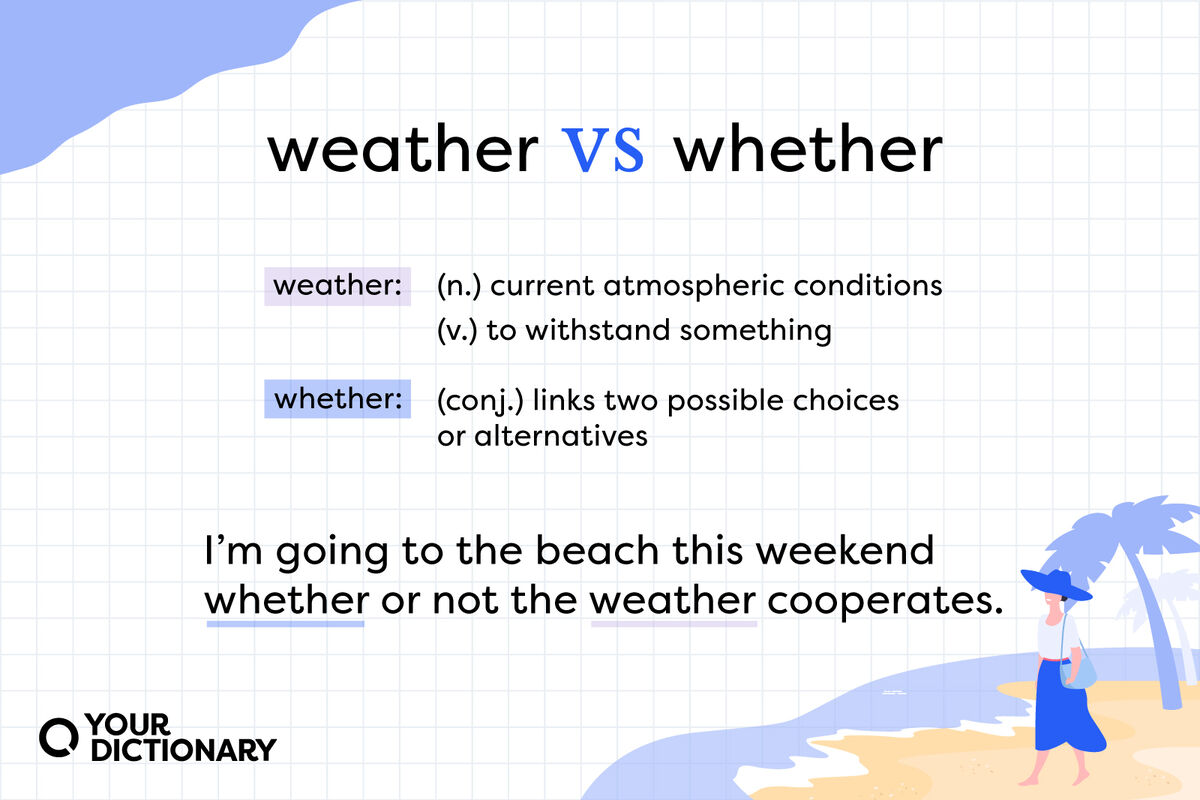
The words weather and whether can easily be confused with one another. These words are homophones, which means that they sound virtually the same when spoken, yet are not spelled the same and have different meanings. Making the right choice between weather vs. weather requires learning their meanings and their parts of speech.
When To Use "Weather"
The term weather can be a noun or a verb. Each usage has different meanings.
"Weather" as a Noun
When weather is a noun, it refers to current atmospheric conditions, such as heat and temperature, snow, wind, rain, or barometric readings.
Review a few examples of using weather in a sentence to see how weather is used as a noun.
- I checked the news to find out the weather forecast for tomorrow.
- In the Northeast, the weather is typically hot and humid in the late summer months.
- This rainy weather is making it difficult for me to plant seeds in my garden.
"Weather" as a Verb
When weather is a verb, it usually means to withstand something, such as a storm or crisis. It can also refer to what happens to an object when it is exposed to the elements. This usage is not as common as the noun form.
There are a number of ways weather can be used in sentences in its verb form.
- The lost dog weathered five nights in the bitter cold before his owners found him.
- I know our family will weather this storm, and then things will get back to normal.
- Leaving the cushions on the outdoor furniture will cause the upholstery to weather.
When to Use "Whether" (Conjunction)
Unlike the word weather, the term whether is not a noun or verb, but rather is a conjunction.
A conjunction is a word that joins two words or phrases together. The term whether is similar in meaning to the word if. It is usually used as part of a phrase that also includes the word or, serving to link together two possible choices or alternatives.
Consider a few examples of using whether in a sentence to see how the word works.
- The boy shouted, "I plan to go out whether you like it or not!"
- I am not sure whether or not to fly to Ohio for my cousin's wedding.
- Whether she realizes it or not, she’s lucky to have a friend like you.
How To Remember the Difference Between "Weather" and "Whether"
To master the difference between these homophones, just follow a few steps.
Step 1: Memorize the Meanings
Memorize the definitions and parts of speech of each word. You can even have others test you on their meanings.
For example, they can read you a sentence utilizing weather, and you have to tell them which homophone is being used in that particular sentence.
Step 2: Review Example Sentences With Both Words
While it may sound a little odd, there are circumstances where both words (weather and weather) could correctly be used together in the same sentence.
Reviewing these terms in such a context can help you develop a deeper understanding of how the words differ.
- I’m not sure whether my worn out water-resistant boots will weather another outing in the pouring rain.
- I’m going to the beach this weekend whether or not the weather cooperates.
Step 3: Practice Proper Usage
Practice using weather and whether in your writing.
- Write several sentences using just the word weather as a noun, then as a verb.
- Write several sentences using the word whether.
- When you are comfortable with what you’ve practiced so far, try your hand at writing sentences with both words in one sentence.
What Are "Homographs"?
Homographs are words that are spelled the same, but have different meanings. Homographs may or may not be pronounced the same.
The word bow means to bend down as a sign of appreciation or respect, while bow means a decorative knot. The English language has many examples of homographs.
What Are "Homophones"?
Homophones are words that sound the same, but may have different spellings and meanings. In addition to weather vs. whether, there are various other examples of homophones in the English language.
- mail and male
- its and it's
- their, there and they're
- weight and wait
- except and accept
- insure and ensure
Best Practices for Correct Usage
Whenever you are dealing with homophones, remember these important steps to help you avoid using the wrong terms in your writing.
- Learn the word's part of speech.
- Learn the word's definition.
- Practice using the word in context by reading sentences, writing sentences, and saying and listening to phrases that include the words.
- Have someone test you on the meanings of these terms.